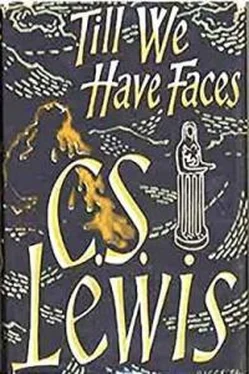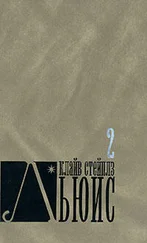“I see,” said Psyche in a low voice. “You think it devours the offering. I mostly think so myself. Anyway, it means death. Orual, you didn’t think I was such a child as not to know that? How can I be the ransom for all Glome unless I die? And if I am to go to the god, of course it must be through death. That way, even what is strangest in the holy sayings might be true. To be eaten and to be married to the god might not be so different. We don’t understand. There must be so much that neither the Priest nor the Fox knows.”
This time I bit my lip and said nothing. Unspeakable foulness seethed in my mind; did she think the Brute’s lust better than its hunger? To be mated with a worm, or a giant eft, or a spectre?
“And as for death,” she said, “why, Bardia there (I love Bardia) will look on it six times a day and whistle a tune as he goes to find it. We have made little use of the Fox’s teaching if we’re to be scared by death. And you know, Sister, he has sometimes let out that there were other Greek masters than those he follows himself; masters who have taught that death opens a door out of a little, dark room (that’s all the life we have known before it) into a great, real place where the true sun shines and we shall meet——”
“Oh, cruel, cruel!” I wailed. “Is it nothing to you that you leave me here alone? Psyche; did you ever love me at all?”
“Love you? Why, Maia, what have I ever had to love save you and our grandfather the Fox?” (But I did not want her to bring even the Fox in now.) “But, Sister, you will follow me soon. You don’t think any mortal life seems a long thing to me tonight? And how would it be better if I had lived? I suppose I should have been given to some king in the end; perhaps such another as our father. And there you can see again how little difference there is between dying and being married. To leave your home—to lose you, Maia, and the Fox—to lose one’s maidenhead—to bear a child—they are all deaths. Indeed, indeed, Orual, I am not sure that this which I go to is not the best.”
“This!”
“Yes. What had I to look for if I lived? Is the world—this palace, this father—so much to lose? We have already had what would have been the best of our time. I must tell you something, Orual, which I never told to anyone, not even you.”
I know now that this must be so even between the lovingest hearts. But her saying it that night was like stabbing me.
“What is it?” said I, looking down at her lap where our four hands were joined.
“This,” she said, “I have always—at least, ever since I can remember—had a kind of longing for death.”
“Ah, Psyche,” I said, “have I made you so little happy as that?”
“No, no, no,” she said. “You don’t understand. Not that kind of longing. It was when I was happiest that I longed most. It was on happy days when we were up there on the hills, the three of us, with the wind and the sunshine … where you couldn’t see Glome or the palace. Do you remember? The colour and the smell, and looking across at the Grey Mountain in the distance? And because it was so beautiful, it set me longing, always longing. Somewhere else there must be more of it. Everything seemed to be saying, Psyche come! But I couldn’t (not yet) come and I didn’t know where I was to come to. It almost hurt me. I felt like a bird in a cage when the other birds of its kind are flying home.”
She kissed both my hands, flung them free, and stood up. She had her father’s trick of walking to and fro when she talked of something that moved her. And from now till the end I felt (and this horribly) that I was losing her already, that the sacrifice tomorrow would only finish something that had already begun. She was (how long had she been, and I not to know?) out of my reach; in some place of her own.
Since I write this book against the gods, it is just that I should put into it whatever can be said against myself. So let me set this down; as she spoke I felt, amid all my love, a bitterness. Though the things she was saying gave her (that was plain enough) courage and comfort, I grudged her that courage and comfort. It was as if someone or something else had come in between us. If this grudging is the sin for which the gods hate me, it is one I have committed.
“Orual,” she said, her eyes shining. “I am going, you see, to the Mountain. You remember how we used to look and long? And all the stories of my gold and amber house, up there against the sky, where we thought we should never really go? The greatest King of all was going to build it for me. If only you could believe it, Sister! No, listen. Do not let grief shut up your ears and harden your heart——”
“Is it my heart that is hardened?”
“Never to me; nor mine to you at all. But listen. Are these things so evil as they seemed? The gods will have mortal blood. But they say whose. If they had chosen any other in the land, that would have been only terror and cruel misery. But they chose me. And I am the one who has been made ready for it ever since I was a little child in your arms, Maia. The sweetest thing in all my life has been the longing—to reach the Mountain, to find the place where all the beauty came from——”
“And that was the sweetest? Oh, cruel, cruel. Your heart is not of iron; stone, rather,” I sobbed. I don’t think she even heard me.
“—my country, the place where I ought to have been born. Do you think it all meant nothing, all the longing? The longing for home? For indeed it now feels not like going, but like going back. All my life the god of the Mountain has been wooing me. Oh, look up once at least before the end and wish me joy. I am going to my lover. Do you not see now——?”
“I only see that you have never loved me,” said I. “It may well be you are going to the gods. You are becoming cruel like them.”
“Oh, Maia!” cried Psyche, tears at last coming into her eyes again. “Maia, I——”
Bardia knocked on the door. No time for better words, no time to unsay anything. Bardia knocked again, and louder. My oath on his sword, itself like a sword, was upon us.
So, the last, spoiled embrace. Those are happy who have no such in their memory. For those who have—would they endure that I should write of it?
As soon as I was out in the gallery my pains, which I had not perceived while I was with Psyche, came strongly back upon me. My grief, even, was deadened for a while, though my wits became very sharp and clear. I was determined to go with Psyche to the Mountain and the holy Tree, unless they bound me with chains. I even thought I might hide up there and set her free when the Priest and the King and all the rest had turned to come home. “Or if there is a real Shadowbrute,” I thought, “and I cannot save her from it, I’ll kill her with my own hand before I’ll leave her to its clutches.” To do all this I knew I must eat and drink and rest. (It was now nearly twilight and I was still fasting.) But first of all I must find out when their murder, their Offering, was to be. So I limped, holding my side, along the gallery and found an old slave, the King’s butler, who was able to tell me all. The procession, he said, was to leave the palace an hour before sunrise. Then I went to my own chamber and told my women to bring me food. I sat down to wait till it came. A great dullness and heaviness crept over me; I thought and felt nothing, except that I was very cold. When the food came I could not eat, though I tried to force myself to it; it was like putting cloth in my mouth. But I drank; a little of the small beer which was all they had to give me, and then (for my stomach rose against the beer) a great deal of water. I must have been almost sleeping before I finished, for I remember that I knew I was in some great sorrow but I could not recall what it was.
Читать дальше











